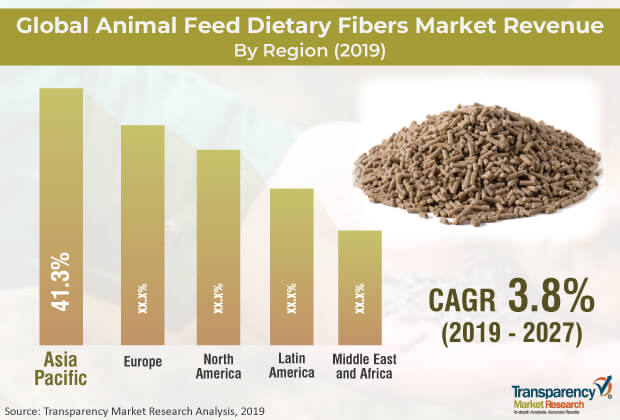According to a new research report titled ‘Animal Feed Dietary Fibers Market – Global Industry Analysis, Size, Share, Growth, Trends, and Forecast, 2019–2027’ published by Transparency Market Research (TMR) , the global animal feed dietary fibers market is estimated to reach US$ 95.1 Bn by 2027. It is anticipated to expand at a CAGR of 3.8% during the forecast period. The global animal feed dietary fibers market is estimated to be driven by the rise in livestock population and increase in awareness about animal health.

Request For Sample:https://www.transparencymarketresearch.com/sample/sample.php?flag=S&rep_id=66830
Increase in Demand for Meat to Drive Market
The future of food chain depends on innovative, sustainable, and efficient feed concepts. Global consumption of meat has been rising. According to the United Nations (UN), the global population is estimated to surpass 9.6 billion by 2050. Demand for meat products has been increasing in highly populated countries such as China and India due to the expansion of the middle class. Sustainability of animal diets is crucial in the development of livestock production. Rise in livestock productivity, which is pivotal for meeting the large demand for livestock products, cannot be achieved without the use of sustainable animal diets. Dietary fibers constitute significant portion of animal feed. Dietary fibers are essentially used to improve intestinal health of animals. They are also used for the weight management of animals. Demand for meat is rising by 2% to 3% every year. It is expected to continue to increase by 2050, with more than nine billion people consuming larger amounts of meat. This is estimated to provide significant opportunities for manufacturers of animal feed dietary fibers during the forecast period.
Request PDF Brochure :https://www.transparencymarketresearch.com/sample/sample.php?flag=B&rep_id=66830
Technological advancements in the animal feed industry are expected to significantly improve the overall efficiency of the production of animal feed dietary fibers. Effective livestock production systems are essential to cater to the demand for animal products in a sustainable manner. Currently, livestock production systems require substantial usage of resources such as energy, land, chemicals, and water – all of these are increasingly becoming scarce. Production of meat is highly water intensive. Large amount of land is required to grow sufficient crops to feed livestock. However, this land could be more efficiently used to meet the increase in food requirements of the expanding global populace. Thus, rise in awareness about environmental concerns associated with meat production is anticipated to adversely affect the demand for animal feed dietary fibers in the near future.
The global animal feed dietary fibers market is governed by strong regulatory framework. For instance, in the U.S., the Food and Drug Administration (FDA) and Association of American Feed Control Officials (AAFCO) work together to regulate animal feed, particularly in the establishment of definitions to describe and approve new feed ingredients.
Buy Now :https://www.transparencymarketresearch.com/checkout.php?rep_id=66830<ype=S
Sections of the Federal Food, Drug, and Cosmetic Act (FD&C Act), including CFR Part 573, Part 570, and Part 584, represent the fundamental guidelines for animal feed dietary fibers industry participants. Implementation of stringent regulatory framework regarding the nutritive value, quality, compatibility, and labelling of the animal feed is projected to boost the demand for animal feed dietary fibers in the next few years.
Corn and Compound Feed Segments to Dominate Global Animal Feed Dietary Fibers Market
Based on type, the global animal feed dietary fibers market has been divided into corn, cereals, grains, pine, potato, spruce, and others (including vegetables, fruits, and sugar beet pulp). Corn was the leading segment of the market in 2018. This trend is projected to continue during the forecast period. The corn segment is projected to hold the largest share above 40% of global animal feed dietary fibers market by 2027. Corn provides adequate amounts of dietary fibers to animals. It also promotes rumen bacterial growth, thus enhancing the feed digestibility.
Explore Transparency Market Research’s award-winning coverage of the global Industry:https://www.prnewswire.com/news-releases/increasing-focus-on-health-and-wellness-serving-as-significant-growth-boosting-factor-for-global-ursolic-acid-market-between-2020-and-2030-tmr-301150978.html
Fragmented Market
The global animal feed dietary fibers market was highly competitive in 2018 due to the presence of several large market players. Key manufacturers operating in the industry include Cargill, Incorporated, Roquette Frères, ADM, Associated British Foods plc, Tate & Lyle, Ingredion, and J. RETTENMAIER & SÖHNE GmbH + Co KG. Manufacturers of animal feed dietary fibers are adopting various strategies such as plant capacity expansion, mergers & acquisitions, and distribution channel expansion to strengthen their market position. For instance, in March 2017, ADM expanded its animal nutrition capabilities in China, with new facilities in Xiangtan and Nanjing.
The global animal feed dietary fibers market has been segmented as follows:
Global Animal Feed Dietary Fibers Market, by Type
- Corn
- Cereals
- Grains
- Pine
- Potato
- Spruce
- Others (including vegetables, fruits, and sugar beet pulp, etc.)
Global Animal Feed Dietary Fibers Market, by Application
- Pet Food
- Compound Feed
- Specialty Feed
About Us :
Transparency Market Research is a global market intelligence company, providing global business information reports and services. Our exclusive blend of quantitative forecasting and trends analysis provides forward-looking insight for thousands of decision makers. Our experienced team of Analysts, Researchers, and Consultants, use proprietary data sources and various tools and techniques to gather, and analyze information.
Our data repository is continuously updated and revised by a team of research experts, so that it always reflects the latest trends and information. With a broad research and analysis capability, Transparency Market Research employs rigorous primary and secondary research techniques in developing distinctive data sets and research material for business reports.




0 Comments